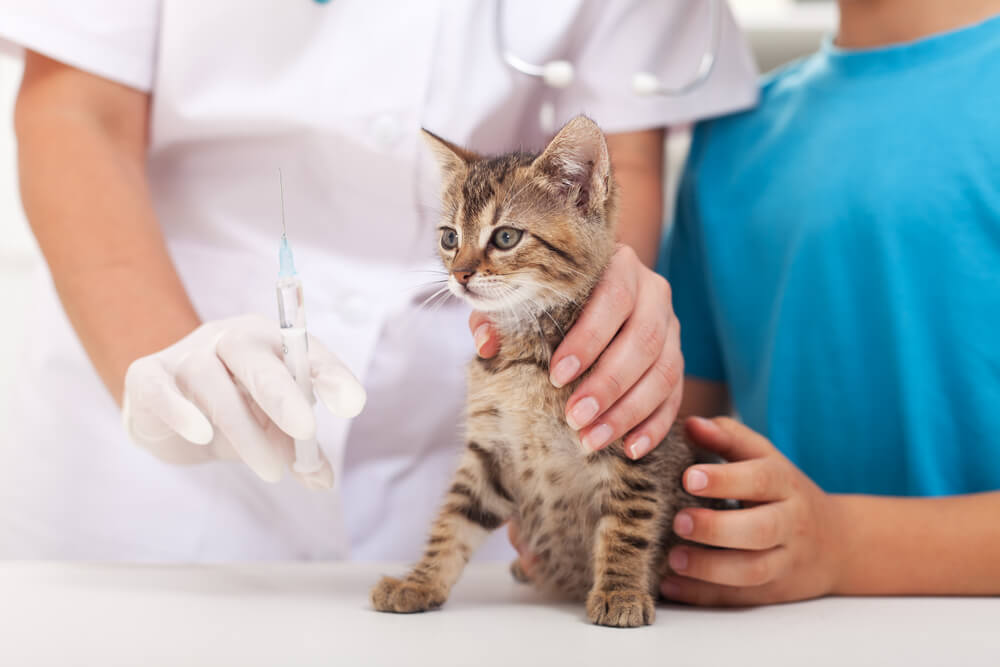
For many years, infectious diseases claimed many pet lives, often during their puppy or kitten years. Thanks to modern science, we now have vaccines that can protect our furry friends from the deadliest of these diseases. Over time, vaccine availability and protocol recommendations have changed significantly, and the Towne Centre Animal Hospital team knows pet owners often feel confused about what to do. Here is everything you need to know about vaccinating your pet.
How pet vaccines work
A vaccine trains your pet’s body to respond to a foreign invader, most often bacteria or viruses. The vaccine does not make your pet sick, but instead helps them make antibodies that will fight the disease if they become infected in the future. Some vaccines are highly effective and prevent pets from getting sick at all, while others work in the same way as a human flu vaccine—they may not provide complete protection but they can decrease the severity of the infection, hasten recovery, reduce complications, and reduce spread to others.
Core and non-core pet vaccines
Vaccine recommendations are split into two categories—core and non-core. Core vaccines are essential for all pets and to protect the community, while non-core vaccines are given only to those pets whose lifestyle places them in a higher risk category. As a general rule, most core vaccines need boosters every three years, while non-core vaccines usually require annual boosters to remain effective.
Core vaccines for dogs include:
- Rabies
- Canine distemper combination, including distemper, parvovirus, adenovirus, and parainfluenza.
Non-core vaccines for dogs include:
- Leptospirosis
- Lyme disease
- Bordetella
- Canine influenza
- Rattlesnake toxoid
Core vaccines for cats include:
- Rabies
- Feline distemper combination, including panleukopenia, feline viral rhinotracheitis/feline herpesvirus type 1, and calicivirus
Non-core vaccines for cats include:
- Feline leukemia virus
- Bordetella
- Chlamydia
Lifestyle factors that influence vaccine choice
Whether your pet needs any non-core vaccines depends on their age and lifestyle. Lifestyle factors that influence vaccine choice for dogs include:
- Social behavior — Dogs who spend time around other dogs in day care, boarding and grooming facilities, or dog park settings are more likely to encounter infectious respiratory disease. These dogs should get Bordetella and canine influenza vaccines.
- Proximity to rodents, wildlife, or natural water — Leptospirosis is transmitted through infected urine or contaminated water bodies. New guidelines suggest that because leptospirosis outbreaks are occurring more frequently in more places, this vaccine should be considered for all dogs. For dogs who frequent hiking trails or nature areas, consider the rattlesnake vaccine.
- Tick exposure — Lyme disease is transmitted by ticks and can result in a sneaky, chronic illness condition that leads to kidney or liver failure over time. The Lyme disease vaccine is recommended for pets who spend time in tick-heavy areas.
For cats, vaccine decision-making is a bit simpler. The lifestyle factors to consider for them include:
- Indoor or outdoor status — All cats should receive a feline leukemia virus vaccine as a kitten, but only adults who venture outdoors or live with infected cats need boosters as adults.
- Housing situation — Respiratory disease can spread quickly through crowded multi-cat homes or breeding facilities. Bordetella and chlamydia vaccines should be considered for these cats.
Puppy and kitten vaccines

Puppies and kittens are the most vulnerable to disease because their immune systems are not yet mature enough to mount an effective response. Pets younger than 16 weeks also may have circulating, temporary antibodies they received from their mother, which can prevent the vaccines from taking full effect. To protect these young pets and overcome interactions with maternal antibodies, distemper combination vaccines are repeated every two to four weeks until pets are older than 4 months.
To avoid overwhelming your puppy’s or kitten’s immune system, we will not give them more than a few vaccines during a single visit. If your pet needs multiple non-core vaccines to accommodate their expected lifestyle, we will spread them out over several visits according to which ones are deemed most important for your pet.
A note about vaccine side effects
Although rare, cats can develop a cancerous tumor at their vaccine injection site. Vaccine manufacturers and researchers discovered years ago that the tumors likely are caused by chemicals added to vaccines called adjuvants. Since then, several cat-specific vaccines have been developed without adjuvants, and these ensure your cat can be safely vaccinated.
While uncommon, some pets develop allergic reactions to certain vaccines that may cause vomiting, diarrhea, facial swelling, hives, trouble breathing, or collapse shortly after their visit. Vaccine risks versus benefits are closely evaluated in these pets to determine if future vaccination should be pursued. Because vaccines can aggravate an abnormal immune system, pets with certain medical conditions may not be good vaccine candidates.
You can protect your pet from deadly disease, reduce the incidence of disease in your community, and reduce disease spread from animals to humans by keeping your furry friend up to date on their vaccinations. Call the Towne Centre Animal Hospital team if you have questions about your pet’s vaccinations, or to schedule their next vaccine or wellness appointment.
